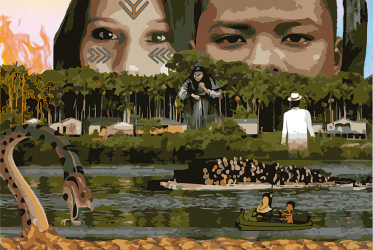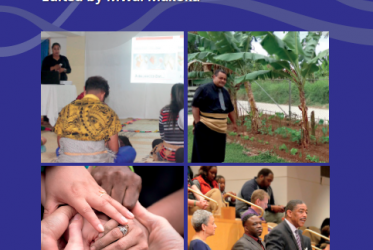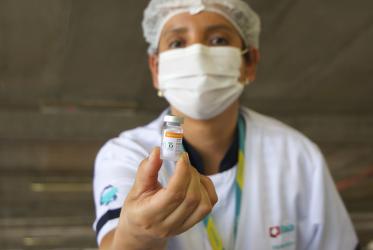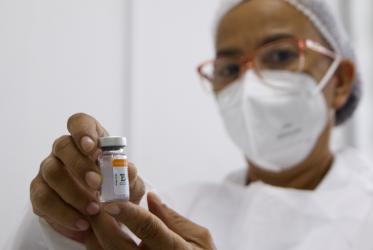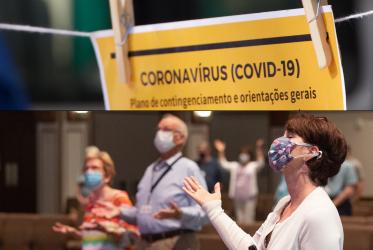Interview with the Archbishop of Albania, former President of the WCC
by Marianne Ejdersten, WCC director of Communication
Archbishop Anastasios of Tirana, Durrës and All Albania shares his perspective in this E-interview about the way churches are adapting, both in Albania and worldwide, to the COVID-19 pandemic. As we pray for the researchers trying to find a treatment, churches can also emphasize our duty to stay at home while, at the same time, freeing ourselves from fear and anxiety. We must find ways to assist the sick directly or indirectly, as we prepare for Easter, and open our hearts to the light of hope.
In what ways is Your Beatitude seeing churches adapt to life amid the coronavirus outbreak? In Albania, and worldwide.
Archbishop Anastasios: When we were informed about the spread of the pandemic of COVID-19 in Albania, we addressed our people (on 12 March and 17 March 2020) insisting that we must avoid panic, depression, and despair. We noted that composure, sobriety, and careful concern and constant discipline towards the instructions and health directives of the responsible governments are required of us. We announced that we were canceling all services in our churches, and we advised that the people avoid the traditional embraces, kissing of holy objects in the church, kissing of hands, and any physical contact. Every Sunday as well as on Great Feasts, we celebrate the Divine Liturgy in the chapel of the Synodical Center with closed doors. These services are transmitted on the radio station of the Church as well as online. Similarly, the ecclesiastical Services will continue in the other Dioceses in small chapels with closed doors. We advised those who are more susceptible, the elderly and children, to remain at home for a period of time. The churches will remain open during the day for personal prayer. Faith and love are the most powerful defensive weapons against the attack of this invisible virus. I know that many other Churches have also addressed their own faithful in similar ways.
In what ways can churches in Albania be a role model for others?
Archbishop Anastasios: We took some initiatives, sharing our ideas with the other religious communities of Albania. But it is too much to say that we are a ‘model’ for anyone. Every Church in the various countries has special needs and situations to respond to. We prepared a more general message (20 March) addressed to the multi-faith society of Albania which was published and transmitted by the mass media of the country. In this message we added that we owe wholehearted thanks to those who are tasked with maintaining public cleanliness, order, and information, and especially to the healthcare professionals who are on the vanguard of the battle for the care of the infected. We emphasized that while remaining inside our homes, let us not permit irritations and conflicts to fester, but let us cultivate creativity, a peaceful disposition, kindness, understanding, affection, and love.
We highlighted that all who are faithful, let us intensify our prayer for the period of this trial to not be protracted, for the recovery of those who are seriously afflicted, and for the spread of the pandemic to be limited. Even more, let us pray that God enlightens the researchers to swiftly determine the proper preventive and therapeutic processes. Something good will ultimately come out of this crisis and we hope that human societies will reexamine their values and priorities.
How can we protect lives? What can we, as church/religious communities do?
Archbishop Anastasios: Primarily we must emphasize our duty to remain at home according to the directives of the government and the healthcare authorities. We have to stop travels and circulation. Let us be vigilant that these measures do not lead to a personal isolation. On the contrary, let us strengthen each other with courage, prayer, words, simple acts, silence full of affection; especially towards those who are at greater risk.
It is important that in the conscience of the community is the awareness that the services are continuously celebrated in chapels throughout all the Dioceses, with closed doors – as symbolic candles. It is not only the coronavirus that is transmittable, at the same a freedom from fear and anxiety based on faith and love must be transmitted continuously with a joyful disposition.
What can we do when safe gatherings are no longer possible or when an increasing number of at-risk persons are unable to attend services?
Archbishop Anastasios: In countries where the Church has the possibility to provide television or radio feeds, we can enhance the transmission of the services though these forms of media while advising our people to follow these transmissions. Regarding Sunday School for the children, lessons and videos can be created online and shared by the parishes. The faithful can also create a type of home church for this period, praying the services in the small group of the family, and perhaps together with a neighboring family, in order that we may celebrate the services together. Another proposal is to create Bible Study Groups. Other opportunities include singing together and listening to Church music and hymns together.
What about 'stigma and discrimination’?
Archbishop Anastasios: It would be a great mistake to discriminate or place a stigma on those who are infected by this disease. On the contrary, this adventure brings them to the status of the ‘least of these’ which Christ refers to in his account of the Last Judgment (Matthew 25). Our attitude towards these new cases of ‘the least of these’ is our attitude to Christ Himself. We must find ways to assist the sick directly or indirectly; to help their families and children if they do not survive. Of course, we also are obliged to support all the healthcare professionals, who come in contact with the virus daily, and continuously express our gratitude to them through prayer and by following their guidelines.
As Albania confronts unprecedented challenges, what can the global fellowship pray for you?
Archbishop Anastasios: The common prayer for all countries is that we may pass this trial with the fewest number of victims. This pandemic creates not only infirmities, but also creates widespread economical consequences, especially devastating for poorer countries like Albania which has also recently suffered from the disastrous effects of a great earthquake. The pandemic is not local; it is global. Therefore, the response must also be with a global solidarity in order to have a ‘globalization of solidarity.’ The richer countries have a responsibility to assist the poorer countries, like Albania, that will suffer more acute consequences of the financial troubles and social problems.
Since we are in the period of preparation for Easter, let us remember that the crucified and resurrected Christ offered to His disciples peace and freedom from fear, promising them that He will remain with them through all tribulations until the end of time. We must increase this confidence in His presence and in the fact that He will not abandon us in our trial. Let us celebrate Easter free of every syndrome of fear and anxiety, let us resist.
This year we shall not be able to transmit the Paschal light from candle to candle - as is the custom of the Orthodox Churches. Let us transmit from heart to heart the light of hope and fearlessness in our Risen Lord.
Christ is Risen!
The WCC interview produced in collaboration with the Orthodox Autocephalous Church of Albania
